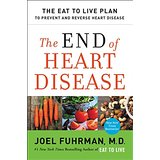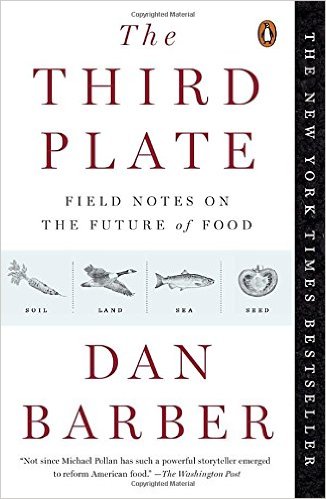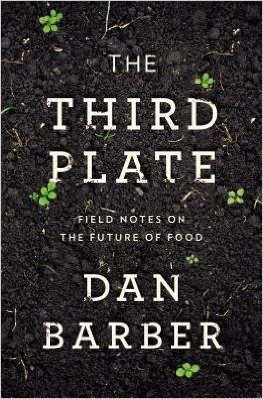Category Archives: Latest Info
The End of Heart Disease
by Joel Fuhrman, MD, Harper One, 2016
According to Dr. Furhman, his Nutritarian Diet will make it impossible to have a heart attack, while it reverses obstructive coronary artery disease (CAD) and radically lowers your cholesterol and blood pressure, reduces your weight, restores normal bowel function, improves your immune function and maintains youthful vigor in the face of aging. Fuhrman’s Nutritarian diet can be totally plant-based or it can be flexitarian which includes some animal products albeit in very small quantities (three small servings a week). But in either case, it is predominantly vegetables, beans seeds and nuts. The goal is a diet that is nutrient dense, hormonally favorable (avoiding, especially, excess insulin and insulin growth factor [IGF-1]), nutritionally adequate (including all essential nutrients), and avoids toxins. The basis for the diet’s choices are ANDI scores (Aggregate Nutrient Density Index) that ranks foods based on the nutrients delivered for each calorie consumed.
Why a Plant-Based (aka Vegan) Diet? The films that tell the story
Sometimes it’s hard to tell someone about eating a whole-foods, plant-based diet without sounding like you are proselytizing – a big no, no IMO. So offering a film that says it all in a non-threatening way is a gret way to go. It worked for us. A friend gave us Mike Andersen’s Eating DVD – right on the heels of having read T. Colin Campbell’s The China Study – and that changed the food habits of five or six people.
There are some superb films and DVDs that have been produced recently that make a clear case for a WFPBD. This my list of personal favorites:
Forks Over Knives (2011) created by Brian Wendel, featuring T. Colin Campbell, Caldwell Esselstyn and Neal Barnard
Got the Facts on Milk? (The Milk Documentary) (2011, 2007) by Shira Lane. Effectively questions the health benefits of milk and dairy products. Features T. Colin Campbell, Caldwell Esselstyn and Neal Barnard
Fat, Sick and Nearly Dead (2010) by Joe Cross. A personal documentary of a person with an autoimmune disease taking back his health care and trading in his pills for a juicer.
Fresh (2009) by Ana Jones. Features Joe Salatin, Will Allen, David Ball. Takes a hard look at our food production system and the negative impact of agribusiness. Takes up where Food, Inc. leaves off adding possible solutions.
Eating, 3rd Ed. (2008) a DVD on the RAVE Diet by Mike Andersen (also a book). An earlier version of this film convinced us to change from a whole-foods, sugar & meat-free diet to a total Whole Foods Plant-Based Diet (a bigger change than one might think).
Food Inc. (2008) directed by Robert Kenner. Features Michael Pollack. Champions more compassionate treatment of meat animals, but does not support a plant-based-only diet
Food Matters (2008) by James Colquhoun & Laurentine ten Bosch. Features Charlotte Gerson, Andrew Saul, Dan Rogers, David Wolfe,
Fast Food Nation (2006). Looks at the destructive impact of eating meat on health, animals and the environment
Super Size Me (2004). Morgan Spurlock’s 30-days on a McDonald’s-only diet
Foodmatters
Reference List for Plant-Based (aka Vegan) Gurus
While I don’t agree completely with any of these sources, they are, IMO, all very good and each makes a solid case for his/her slightly different perspective.
T. Colin Campbell, PhD
The China Study (2004)
Caldwell B. Esselstyn, Jr., MD
Prevent and Reverse Heart Disease: The Revolutionary, Scientifically Proven, Nutrition-Based Cure (2008)
Joel Fuhrman, MD
Eat to Live: The Amazing Nutrient-Rich Program for Fast and Sustained Weight Loss, Revised Edition (2011)
Annemarie Colbin, PhD
The Whole-Food Guide to Strong Bones: A Holistic Approach (2009)
Neal Barnard, MD
Dr. Neal Barnard’s Program for Reversing Diabetes: The Scientifically Proven System for Reversing Diabetes without Drugs (2008)
Andrew Weill, MD
Spontaneous Happiness (2011)
Mark Hyman, MD
The Blood Sugar Solution: The UltraHealthy Program for Losing Weight, Preventing Disease, and Feeling Great Now! (2012)
John McDougall, MD
The Starch Solution: Eat the Foods You Love, Regain Your Health, and Lose the Weight for Good! (2012)
Dean Ornish, MD
The Spectrum: A Scientifically Proven Program to Feel Better, Live Longer, Lose Weight, and Gain Health (2008)
Joan Dye Gussow, PhD
Growing, Older – A Chronicle of Death, Life and Vegetables (2010)
For how we got into this mess and what we need to do to get out of it:
David Kessler’s The End of Overeating
Doug Lisle’s The Pleasure Principle
Stewart Brand’s The Whole Earth Discipline
And for the best overall, easy to understand take on WFPBD, I love Julieanna Hever’s Complete Idiots Guide to Plant-Based Nutrition
Dr. John McDougall Challenges Paula Dean
Whole-food, plant-based Diet Guru John McDougall has challenged cook book author and TV personality Paula Dean to a bet. He has invited Ms. Dean, who recently admitted that she has Type 2 Diabetes, to spend ten days at his center learning how to eat healthfully.
Dr. McDougall’s bet: “Would we love a trim-looking Paula Deen on a cooking show? How would we react if she lost weight and cured her diabetes right in front of our eyes? I am willing to make a giant effort to help Paula help herself and America become trimmer and healthier. I am publically inviting her to my 10-day, live-in clinic in Santa Rosa, CA. As an added incentive, I am offering her a Mitt Romney size bet* that my Program will change her personal health and her style of cooking on her future TV shows. Furthermore, if she attends my program and does not make the significant positive changes that I predict, then I will be a guest on her cooking show and eat sliced beef wrapped in bacon strips and fried in chicken fat. Otherwise, if the McDougall Program does, as I confidently predict, cause her to lose weight, lower her blood sugar, and get her off her diabetic drugs, then she will agree to be a speaker at my next Advanced Study Weekend, September 7-9, 2012, and prepare a five-course, low-fat vegan meal with a starch centerpiece, ending with a healthy dessert.”
http://www.drmcdougall.com/misc/2012nl/jan/deen.htm
Sadly, it appears that she is using this platform to promote the diabetes drug, Victoza.
Paula Dean Admits to the Country’s #1 Life-Style Disease – Type 2 Diabetes
Paula Dean, Food Network’s queen of artery-clogging cuisine, has just acknowledged that she has Type Two diabetes. When every recipe starts with “take two sticks of butter” and finishes with “sprinkle the top with two cups of grated cheese,” this should not come as a huge surprise. Type 2 diabetes has long been recognized in prominent scientific circles as the poster child of life-style diseases. Hopefully Ms. Dean will take this opportunity to read the literature, treat her disease with a whole-food, plant-based diet rather than drugs, change what she sells on her show, and make a real difference across the US.
Read the full story on the Huffington Post. http://www.huffingtonpost.com/kristin-wartman/paula-deen-diabetes_b_1220459.html
Studies have demonstrated that a whole-foods plant-based diet can reverse Type 2 diabetes in many people, and can dramatically reduce the need for drugs in others.
Traveling on a Whole-Foods Plant-Based Diet
As a passionate traveler, cruising boater, writer and cook, I find that food always takes center stage. Searching out local markets, discovering healthy, flexible restaurants and figuring out how to take enough provisions through security to manage a twelve-hour flight seem to percolate right to the top.
Managing a plant-based diet while traveling can be a job in itself – because we really do love to eat. When we are cruising on our boat, or a on a charter yacht, at least we have a galley – although finding ingredients in far flung ports can be challenging (that’s half the fun). But when we’re traveling by car or air and staying in hotels, often on assignment or at a meeting or convention, the challenges once greater are now moderating. In the decade we’ve been eating plant-based, so much has changed. Plant-based eating has gone mainstream. We will always seek out the top one or two vegan restaurants in a new city or port to experience that chef’s perspective and learn something new – and also to relax with the knowledge that everything on that menu works for us without any questions. The rest of the time, we generally manage quite well in regular eateries. These days there’s almost always a dish or two on the menu that if not totally plant-based, can usually be slightly modified. And if there isn’t, all we have to do is ask! “Vegetable forward” seems to be the phrase of the day
The problems we’ve encountered, the solutions we’ve devised, the research we’ve done, the food we’ve eaten, the books we’ve read, the documentaries we’ve viewed, the courses we’ve taken and and the adventures we’ve experienced are the main threads of this blog. Hopefully many readers will share their own adventures – and their solutions as well.


